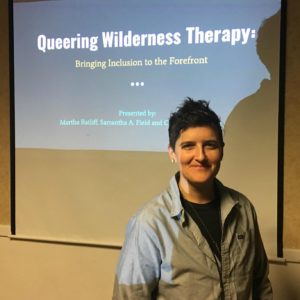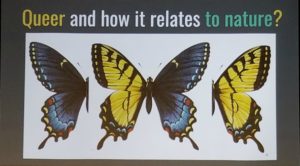 By: Clementine Wilson, Adolescent Field Manager
By: Clementine Wilson, Adolescent Field Manager
**A note on the word Queer: “We recognize and honor that the word “queer” has been used in the past as a derogatory term and is still very hurtful for some in the LGBTQIA+ community. Many LGBTQIA+ organizations and communities have reclaimed the word “queer” and this has been both empowering and uniting of the multiple complex identities within the community…” (wording borrowed from the School of Lost Borders Queer Quest description)
I had the privilege of co-presenting and representing Pacific Quest at the Regional Wilderness Therapy Symposium in Asheville, NC last month. Myself, Martha Ratliff, and Samantha Field (collaborators from different organizations) presented a 3-hour workshop on the importance of LGBTQIA+ inclusion and support in the outdoor behavioral health industry. We had 20 participants attend our workshop including field guides, therapists, admissions counselors, educational consultants, and program management representatives.
Our workshop addressed the importance of catching up with Gen Z’ers as they pave the way for inclusion. Through lecture, self-reflection and short experiential activities, we illustrated what it means to build an inclusive and accessible program, asking the questions: Who is not being included? Whose voice is not being heard? Our main focus was field considerations, staff training and facilitating rites of passage ceremonies designed for queer youth and adults.
According to the J. Walter Thompson Innovation Group, in 2016, more than 52% of Gen Z’s (ages 13-20) reported they identify as something other than heterosexual. In the same study, 56% of Gen Z’s said that they knew someone who went by gender neutral pronouns such as “they,” “them,” or “ze.” At Pacific Quest, according to our surveys in conjunction with the National Association of Therapeutic Schools and Programs (NATSAP) taken during the student’s first week of treatment, approximately 28% of our student population (adolescent and young adult) identifies as something other than heterosexual. This number does not include those students who have yet to come out but may do so during the treatment process. In addition, we also serve many trans* identified and gender nonconforming students. With these stats, it is abundantly clear that a significant portion of our student population doesn’t fit into an assumed heterosexual/cisgender identity framework. Therefore, it is important for programs to make their curriculum inclusive and relevant to support healthy queer identity development. It is vitally important that programs are reviewing their policies and procedures to ensure the health, safety and wellbeing of their transgender students.
One of our foundational guiding principles at Pacific Quest is Rites of Passage, and many other outdoor therapeutic programs use a rites of passage paradigm to frame the adolescent coming of age experience (i.e., The Hero’s Journey, Jumping Mouse, etc). Rites of passage can be defined as “intentional, meaningful markers of transition from one state of being to another,” (definition from Darcy Ottey) and initiation is defined as achieving adult status in one’s community. With no archetypes, lack of healthy role models, and no clearly defined cultural role; queer youth often feel lost, othered and lonely in their identity development. This makes it hard for them to claim and understand their role in the community. When rites of passage are made inclusive for queer youth, and they are able to learn about queer archetypes and role models, they are able to claim their gifts in meaningful and healthy ways.
 Another guiding principle here at Pacific Quest is horticultural therapy and connection to the natural cycles. Through this lens, LGBTQIA+ students are able to see nature as a mirror of their identity experience. They can see that there is queerness in nature and it happens naturally in both the plant and animal kingdoms. Rare and beautiful bilateral gynandromorph butterflies that are half male and half female, and “parrotfish that start out as male or female but have sex organs of both sexes; they are protogynous hermaphrodites, meaning they can change from female to male. Some females will become supermales: larger males with brilliant, lively coloring.” Seeing queerness reflected in nature helps students see that they are rare, special and gifted rather than different, othered, and ultimately shamed for who they are. This shift in lens can mean the world of difference for a young person struggling to claim and be proud of their marginalized identity.
Another guiding principle here at Pacific Quest is horticultural therapy and connection to the natural cycles. Through this lens, LGBTQIA+ students are able to see nature as a mirror of their identity experience. They can see that there is queerness in nature and it happens naturally in both the plant and animal kingdoms. Rare and beautiful bilateral gynandromorph butterflies that are half male and half female, and “parrotfish that start out as male or female but have sex organs of both sexes; they are protogynous hermaphrodites, meaning they can change from female to male. Some females will become supermales: larger males with brilliant, lively coloring.” Seeing queerness reflected in nature helps students see that they are rare, special and gifted rather than different, othered, and ultimately shamed for who they are. This shift in lens can mean the world of difference for a young person struggling to claim and be proud of their marginalized identity.
After participating in our queer inclusive rites of passage experience at Pacific Quest, one student drafted this statement of intent to bring back to his community:
“I am a shameless queer warrior who is fearless, loves himself, and trusts himself unconditionally.”
Queering Wilderness Therapy: Bringing Inclusion to the Forefront
By: Clementine Wilson, Adolescent Field Manager **A note on the word Queer: “We recognize and honor that the word “queer” has been used in the past as a derogatory term and is still very hurtful for some in the LGBTQIA+ community. Many LGBTQIA+ organizations and communities have reclaimed the word “queer��” and this has been …
**A note on the word Queer: “We recognize and honor that the word “queer” has been used in the past as a derogatory term and is still very hurtful for some in the LGBTQIA+ community. Many LGBTQIA+ organizations and communities have reclaimed the word “queer” and this has been both empowering and uniting of the multiple complex identities within the community…” (wording borrowed from the School of Lost Borders Queer Quest description)
I had the privilege of co-presenting and representing Pacific Quest at the Regional Wilderness Therapy Symposium in Asheville, NC last month. Myself, Martha Ratliff, and Samantha Field (collaborators from different organizations) presented a 3-hour workshop on the importance of LGBTQIA+ inclusion and support in the outdoor behavioral health industry. We had 20 participants attend our workshop including field guides, therapists, admissions counselors, educational consultants, and program management representatives.
Our workshop addressed the importance of catching up with Gen Z’ers as they pave the way for inclusion. Through lecture, self-reflection and short experiential activities, we illustrated what it means to build an inclusive and accessible program, asking the questions: Who is not being included? Whose voice is not being heard? Our main focus was field considerations, staff training and facilitating rites of passage ceremonies designed for queer youth and adults.
According to the J. Walter Thompson Innovation Group, in 2016, more than 52% of Gen Z’s (ages 13-20) reported they identify as something other than heterosexual. In the same study, 56% of Gen Z’s said that they knew someone who went by gender neutral pronouns such as “they,” “them,” or “ze.” At Pacific Quest, according to our surveys in conjunction with the National Association of Therapeutic Schools and Programs (NATSAP) taken during the student’s first week of treatment, approximately 28% of our student population (adolescent and young adult) identifies as something other than heterosexual. This number does not include those students who have yet to come out but may do so during the treatment process. In addition, we also serve many trans* identified and gender nonconforming students. With these stats, it is abundantly clear that a significant portion of our student population doesn’t fit into an assumed heterosexual/cisgender identity framework. Therefore, it is important for programs to make their curriculum inclusive and relevant to support healthy queer identity development. It is vitally important that programs are reviewing their policies and procedures to ensure the health, safety and wellbeing of their transgender students.
One of our foundational guiding principles at Pacific Quest is Rites of Passage, and many other outdoor therapeutic programs use a rites of passage paradigm to frame the adolescent coming of age experience (i.e., The Hero’s Journey, Jumping Mouse, etc). Rites of passage can be defined as “intentional, meaningful markers of transition from one state of being to another,” (definition from Darcy Ottey) and initiation is defined as achieving adult status in one’s community. With no archetypes, lack of healthy role models, and no clearly defined cultural role; queer youth often feel lost, othered and lonely in their identity development. This makes it hard for them to claim and understand their role in the community. When rites of passage are made inclusive for queer youth, and they are able to learn about queer archetypes and role models, they are able to claim their gifts in meaningful and healthy ways.
After participating in our queer inclusive rites of passage experience at Pacific Quest, one student drafted this statement of intent to bring back to his community:
“I am a shameless queer warrior who is fearless, loves himself, and trusts himself unconditionally.”
Questions? Call or Text our Admissions Team: 808-937-5806